新概念三册第五课课件
新概念英语第三册第5课(27张PPT)

Eg. Do you know what the consequence of your action will be?
More than 200 people lost their job as a direct consequence of the merge(合并).
America: White House ( the official home of American president)白宫 Pentagon 五角大楼
Russia: Winter Palace 冬宫(过去俄国沙皇的寢宫) the Kremlin ( the government of Russia) 克林姆林宫 Red Square 红场
本地、全国、外国报刊
the press freedom = the freedom of the Press(记者、 新闻界)
issue v. 发行
come out 出版
fax v. n. 传真 send a fax to sb. / fax sb.
impatient adj. 不耐烦的 be impatient at sth. / with sb. 对……不耐烦
2. He went to extremes to steal because of poverty.
In the extreme 极其
extremely adv. 极端地,极其地,非常
eg. He has been generous in the extreme. 他极其慷慨大方。
eg. Personally, I’m extremely well satisfied. 补充: go so far as to do sth. 甚至于…; 竟然做… Eg. 1. I won’t go so far as to say that he is dishonest.
新概念3-5英语第三册第五课

New concept English Lesson 4The facts 确切数字What was the consequence of the editor's insistence on facts and statistics?编辑坚决要求的确切数据和统计数据的结果是什么?consequence,结果insistence,坚决要求statistics,统计数据Editors of newspapers and magazines often go to extremes to provide their readers with unimportant facts and statistics.报纸和杂志的编辑常常在为他们的读者提供不重要的确切数据和统计数据方面走极端go to extremes,走极端Last year a journalist had been instructed by a well-known magazine to write an article on the president's palace in a new African republic.去年,一个新闻记者接到一个知名杂志的指令,写一篇关于一个新的非洲共和国的总统府的文章journalist,新闻记者instruct,指示;命令;吩咐;教授,传授(技能等);告知;通知When the article arrived, the editor read the first sentence and then refuse to publish it.当文章送达,编辑读了第一个句子就拒绝刊登publish,出版;发行;(在报刊)发表,刊登,登载;(在互联网上)发表,公布The article began: 'Hundreds of steps lead to the high wall which surrounds the president's palace'.文章开头:“数百级楼梯通向围绕总统府的高墙”。
新概念三:第五课习题答案及解析

【导语】新概念英语作为家喻户晓的英⽂学习教材,《新概念英语》在中国经久不衰,影响了好⼏代学习者。
即使以今天的⾓度来看,这套出版于⼏⼗年前的教材⽆论是在编排体系,题材和题材,词汇还是语法上都有出彩之处,值得各个层次的⼈学习。
为您整理了以下内容,仅供参考。
希望可以帮助到您!如果您想要了解更多相关内容,欢迎关注! 习题答案: Lesson 51c 2b 3a 4b 5c 6d 7b 8c 9c 10b 11d 12d 习题解析: 1. C excuse n.理由, 借⼝ beyond prep.除…以外 satisfy vt.满⾜, 使满意 dissatisfy vt.使感觉不满, 不满⾜ factual adj.事实的, 实际的 content n.内容 2. B 3. A activity n.⾏动, ⾏为 / suspicious adj.可疑的, 怀疑的 4. B 课⽂中的and then强调动作的先后。
-- Having seen the movie, they went for a walk. 6. D a reply表⽰“任意”的⼀个答复 7. B unless = if not ⼀般过去时 8. C inform sb of/about sth 9. C public n.公众, (特定的)⼈群 audience n.听众, 观众 lecture n.演讲 10. B print = publish press n.压, 按 go to press 交付印刷 pressing adj.紧迫的;迫切的 impress vt.盖印, 留下印象 11. D innocent adj.清⽩的, ⽆罪的, 天真的, ⽆知的 unfortunate adj.不幸的 12. D 请求允许做某事:ask for permission to do sth 允许某⼈做某事:be given permission to do sth admit + 名词/动名词/that从句。
新概念英语第三册第五课PPT课件Lesson 5 The facts

esson 5 The facts
Listen to the tape of the passage and then repeat the sentence one by one. The journalist immediately set out to obtain these important facts, but he took a
Lesson 5 The facts
Listen to the tape of the passage and then repeat the sentence one by one.
Comprehension
1. The editor acted as he did because ___________. (a) he wanted an excuse to fire the journalist (b) he had not read the article beyond the first sentence (c) he was dissatisfied with the factual content of the article (d) he wanted to please the president of the new African republic 2. The journalist took a long time to send the details required because _________. (a) it took him a long time to count all the steps (b) he had not been allowed to fax the information he had obtained (c) he did not realize how soon the magazine would go to press (d) he had been arrested before he had had time to obtain the facts 3. Why had the journalist been arrested? (a) Because his activities must have appeared suspicious. (b) For having gone to extremes to provide unimportant facts. (c) For climbing the palace wall in order to measure its height. (d) Because the article was published in its original form.
英语新概念第五课作文

英语新概念第五课作文英文回答:1. What is the most important lesson you have learned from New Concept English?The most important lesson I have learned from New Concept English is the importance of consistency. Learning a new language takes time and effort, and it is easy to get discouraged if you do not see rapid progress. However, if you are consistent with your studies, you will eventually reach your goals.2. How has New Concept English helped you to improve your English skills?New Concept English has helped me to improve my English skills in many ways. The lessons are well-structured and provide a comprehensive overview of the English language. The exercises help to reinforce the lessons and provideopportunities to practice using the new material. I have also found the audio recordings to be very helpful for improving my pronunciation and listening comprehension.3. What are some of the challenges you have faced while learning English with New Concept English?One of the challenges I have faced while learning English with New Concept English is the lack of immediate feedback. When I am doing the exercises, I am not always sure if my answers are correct. This can be frustrating at times. However, I have found that it is important to be patient and to keep practicing.4. What are your goals for learning English?My goals for learning English are to be able to communicate effectively in both written and spoken English.I want to be able to read English literature, watch English movies, and travel to English-speaking countries without feeling like a language barrier.5. How do you plan to achieve your goals?I plan to achieve my goals by continuing to study New Concept English and by practicing my English skills as much as possible. I will also try to find opportunities to speak with native speakers.中文回答:1. 从新概念英语中学到的最重要的一课是什么?从新概念英语中学到的最重要的一课是坚持的重要性。
新概念第五课
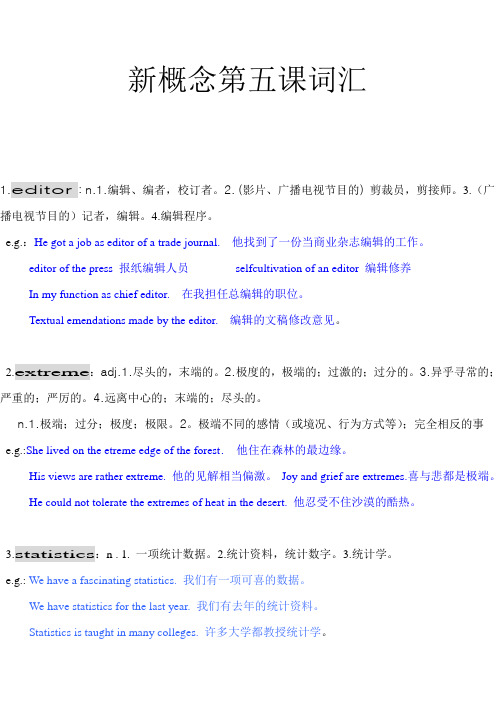
新概念第五课词汇1.editor : n.1.编辑、编者,校订者。
2. (影片、广播电视节目的) 剪裁员,剪接师。
3.(广播电视节目的)记者,编辑。
4.编辑程序。
e.g.:He got a job as editor of a trade journal. 他找到了一份当商业杂志编辑的工作。
editor of the press 报纸编辑人员selfcultivation of an editor 编辑修养In my function as chief editor. 在我担任总编辑的职位。
Textual emendations made by the editor. 编辑的文稿修改意见。
2.extreme:adj.1.尽头的,末端的。
2.极度的,极端的;过激的;过分的。
3.异乎寻常的;严重的;严厉的。
4.远离中心的;末端的;尽头的。
n.1.极端;过分;极度;极限。
2。
极端不同的感情(或境况、行为方式等);完全相反的事e.g.:She lived on the etreme edge of the forest. 他住在森林的最边缘。
His views are rather extreme. 他的见解相当偏激。
Joy and grief are extremes.喜与悲都是极端。
He could not tolerate the extremes of heat in the desert. 他忍受不住沙漠的酷热。
3.statistics:n . 1. 一项统计数据。
2.统计资料,统计数字。
3.统计学。
e.g.: We have a fascinating statistics. 我们有一项可喜的数据。
We have statistics for the last year. 我们有去年的统计资料。
Statistics is taught in many colleges. 许多大学都教授统计学。
新概念第三册第五课
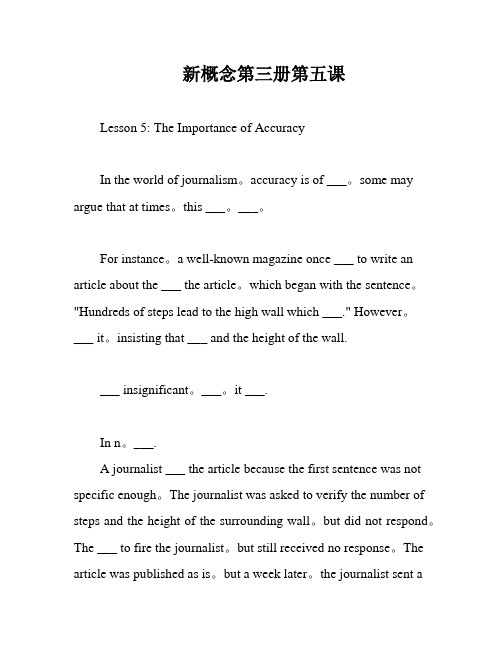
新概念第三册第五课Lesson 5: The Importance of AccuracyIn the world of journalism。
accuracy is of ___。
some may argue that at times。
this ___。
___。
For instance。
a well-known magazine once ___ to write an article about the ___ the article。
which began with the sentence。
"Hundreds of steps lead to the high wall which ___." However。
___ it。
insisting that ___ and the height of the wall.___ insignificant。
___。
it ___.In n。
___.A journalist ___ the article because the first sentence was not specific enough。
The journalist was asked to verify the number of steps and the height of the surrounding wall。
but did not respond。
The ___ to fire the journalist。
but still received no response。
The article was published as is。
but a week later。
the journalist sent afax from prison。
explaining that he was arrested after counting 1,084 steps towards the 15-foot wall.___ set out to get the ___。
新概念英语第五课
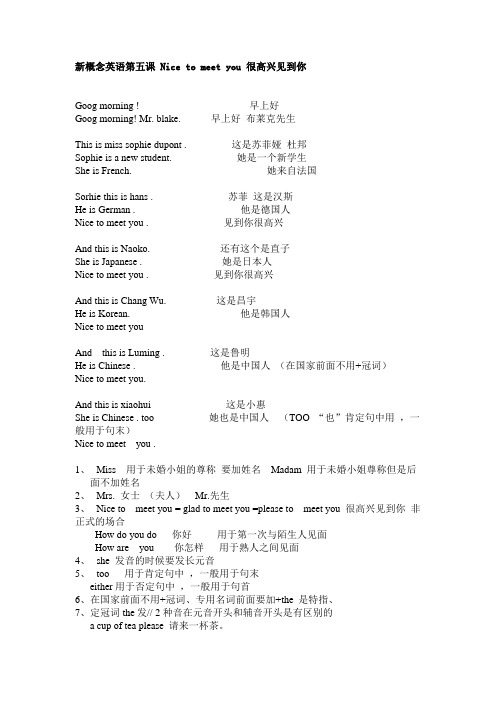
新概念英语第五课 Nice to meet you 很高兴见到你Goog morning ! 早上好Goog morning! Mr. blake. 早上好布莱克先生This is miss sophie dupont . 这是苏菲娅杜邦Sophie is a new student. 她是一个新学生She is French. 她来自法国Sorhie this is hans . 苏菲这是汉斯He is German . 他是德国人Nice to meet you . 见到你很高兴And this is Naoko. 还有这个是直子She is Japanese . 她是日本人Nice to meet you . 见到你很高兴And this is Chang Wu. 这是昌宇He is Korean. 他是韩国人Nice to meet youAnd this is Luming . 这是鲁明He is Chinese . 他是中国人(在国家前面不用+冠词)Nice to meet you.And this is xiaohui 这是小惠She is Chinese . too 她也是中国人(TOO “也”肯定句中用,一般用于句末)Nice to meet you .1、Miss 用于未婚小姐的尊称要加姓名Madam 用于未婚小姐尊称但是后面不加姓名2、Mrs. 女士(夫人)Mr.先生3、Nice to meet you = glad to meet you =please to meet you 很高兴见到你非正式的场合How do you do 你好用于第一次与陌生人见面How are you 你怎样用于熟人之间见面4、she 发音的时候要发长元音5、too 用于肯定句中,一般用于句末either用于否定句中,一般用于句首6、在国家前面不用+冠词、专用名词前面要加+the 是特指、7、定冠词the发// 2种音在元音开头和辅音开头是有区别的a cup of tea please 请来一杯茶。
新概念第三册第五课笔记

Lesson 5 The facts确切数字Editors of newspapers and magazines often go to extremes to provide their readers with unimportant facts and st year a journalist had been instructed by a well-known magazine to write an article on the president’s palace in a new African republic .When the article arrived ,the editor read the first sentence and then refused to publish it.The article began :Hundreds of steps lead to the high wall which surrounds the president’s palace.’The editor at once sent the journalist a fax instructing him to find out the exact number of steps and the height of the wall.The journalist immediately set out to obtain these important facts,but he took a long time to send them .Meanwhile ,the editor was getting impatient ,for the magazine would soon go to press.He sent the journalist two more faxes,but received no reply.He sent yet another fax informing the journalist that if he did not reply soon he would be fired .When the journalist again failed to reply ,the editor reluctantly published the articleas it had originally been written.A week later,the editor at last received a fox from the journalist.Not only had the poor man been arrested ,but he had been sent to prison as well.However,he had at last been allowed to send a fox in which he informed the editor that he had been arrested while counting the 1,084 steps leading to the fifteen-foot wall which surrounded the president’s palace.Today we’ll learn the story about a journalist who was asked to provide some statistics.now please listen to the story ,then let’s learn the new words:Now learn the new words(1).editor n. 编辑(2).extreme n. 极端(3).statistics n.统计数字(4).journalist n. 新闻记者(5).president n. 总统(6).palace n .王宫,宏伟的住宅(7).publish n.出版(8).fax n.传真(9).impatient adj.不耐烦的(10).fire v.解雇(11).originally adv.起初,原先After learning the new words.Now try to answer the question,and do the ask and answer.1.How long ago was this?(Last year )2.Why was the editor dissatisfied with the first sentence?(Because it was too general)3.Did he refuse to publish it?(Yes,he did)4.Why was the editor getting impatient?(Because the magazine would soon go to press)5.How many more faxes did he send the journalist?(Three)6.What did the last one say?(That the journalist would be fried if he didn’t reply)7.How long was it before the journalist could fax the editor?(A week)8.How many steps led to the wall surrounding the president’s palace?(1.084)9.How high was the wall?(Fifteen feet)10.When had the journalist been arrested?(When he was counting the stepsText.课文讲解Editors of newspapers and magazines often go to extremes to provide their readers with unimportant facts and statistics(1).go to extremes 走极端,采取极端手段Eg:Don’t go to extremes in everything.不要凡是都走极端如果用单数,可用go to the extremes of 表示“采取....极端手段。
新概念第三册第五课课文解析

新概念第三册第五课课文解析之杨若古兰创作1.go to extremes 走极端provide = supply 给…,提供(通常与介词搭配连用)provede sb. With sth. / provide sth. for sb.eg:He provided them with a bed for the night.He provided a bed for them for the night.2. ‘…a journalist had been instructed by a well-known magazine to write an article on the president's palace in a new African republic.’自动语态:A well-known magazine instructed a journalist to write an article on the president's palace in a new African republic.’3.The editor at once <sent the journalist a fax>双宾语< instructing>分词作后置定语him to find out the exact number of steps and the height of the wall.instructing—此刻分词进一步弥补说明fax的情况4. not only 位于句首,必须采取倒装方式The poor man had not only been arrested, but had been sent to prison as well.(1)否定副词位于句首,要倒装.eg:Never have I read such stories. 我从来没有读过如许的小说.Nowhere can he find the book he wants. 不管在哪儿他都找不到他想要的那本书.Hardly did I think it possible. 我其实不认为这是可能的.经常使用的否定副词:never, seldom, rarely, little, hardly, scarcely, nowhere, no sooner(2)含有only的状语位于句首,句子要倒装eg:Only then did he realize that he had made a mistake.只要到那个时候,他才认识到本人犯了个错误.Only when a great deal more information has been obtained will it be possible to plan a trip.只要获得比较多的信息以后,才有可能计划去旅行.(3)还有not的副词短语位于句首,要倒装.not for a moment, not in the least , not for an instant, not untilegeg:Not in the least is he interested in Englsh literature. 他对英国文学一点都不感爱好.Not for an instant did i believe he had lied.(4)含有no的短语位于句首,句子要倒装.at no time, in no way, in no sence, by no means, in no case, on no account, on no condition , under no circumstances.‘绝不’eg:Under no circumstances can we accpet the check.不管如何我们不克不及接受这笔钱.On no account must you leave the baby in the house.你不管如何也不克不及把婴儿留在房间里.(5)so,suh位于句首,句子也要倒装.5. However, he <had at last been> 终究,终极 allowed to send a fax in which(in which引诱定语从句润色fax)he informed the editor that (that引诱宾语从句润色informed)he had been arrested while (while引诱时间状语从句)counting the 1,084 steps leading (分词作后置定语)to the fifteen-foot wall which surrounded the president's palace.。
新视野大学英语3Unit5sectionB课后课件
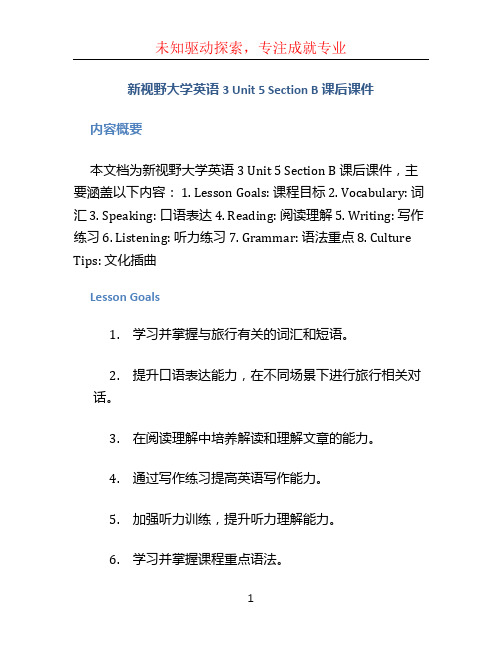
新视野大学英语3 Unit 5 Section B 课后课件内容概要本文档为新视野大学英语3 Unit 5 Section B 课后课件,主要涵盖以下内容: 1. Lesson Goals: 课程目标 2. Vocabulary: 词汇 3. Speaking: 口语表达 4. Reading: 阅读理解 5. Writing: 写作练习 6. Listening: 听力练习 7. Grammar: 语法重点 8. Culture Tips: 文化插曲Lesson Goals1.学习并掌握与旅行有关的词汇和短语。
2.提升口语表达能力,在不同场景下进行旅行相关对话。
3.在阅读理解中培养解读和理解文章的能力。
4.通过写作练习提高英语写作能力。
5.加强听力训练,提升听力理解能力。
6.学习并掌握课程重点语法。
Vocabulary•travel: 旅行•destination: 目的地•luggage: 行李•itinerary: 行程表•accommodation: 住宿•transportation: 交通工具•sightseeing: 观光•souvenir: 纪念品•guidebook: 导游手册•passport: 护照SpeakingTask 1: 与伙伴进行旅行相关的对话根据提供的对话情景,与你的伙伴进行对话练习。
包括以下情景: - 询问旅行计划 - 回答对旅行方式的喜好 - 讨论旅行目的地 - 咨询住宿和交通方式 - 讨论旅行中的活动和观光ReadingPassage 1: Trip to Paris阅读以下文章,然后根据问题回答问题。
Paris, the capital city of France, is a popular destination for travelers all over the world. With its rich history, beautiful architecture, and famous landmarks such as the Eiffel Tower and Louvre Museum, visitors can immerse themselves in the cultural and artistic atmosphere.If you are planning a trip to Paris, here are a few things you should know. First, make sure to visit the famous attractions, such as the Eiffel Tower, Notre Dame Cathedral, and Champs-Élysées. These landmarks represent the spirit and essence of Paris.Second, don’t miss out on the exquisite Fren ch cuisine. From croissants and baguettes to cheese and wine, French food is known for its taste and variety. Try visiting a local café or restaurant to experience the authentic flavors of Paris.Lastly, explore the charming streets and neighborhoods of Paris. Take a walk along the Seine River, visit Montmartre and its famous Sacré-Cœur Basilica, or wander through the artistic district of Le Marais. You will be captivated by the beauty and charm of the city.Questions: 1. What is Paris known for? 2. Name three famous landmarks in Paris. 3. What is special about French cuisine? 4. Name two neighborhoods in Paris that are worth exploring.Passage 2: Travel TipsTraveling can be exciting and fun, but it requires careful planning and preparation. Here are some useful travel tips to make your trip more enjoyable and stress-free.First, make a detailed itinerary. Plan your days and activities in advance so that you can make the most of your trip. Research about the destination, including the local customs, transportation options, and must-see attractions.Second, pack your luggage wisely. Make a checklist of essential items and pack them according to the weather and duration of your trip. Don’t forget to bring important documents such as your passport, identification cards, and travel insurance.Next, book your accommodation in advance. Whether you prefer a hotel, hostel, or vacation rental, make sure to make reservations early to secure the best deals and availability. Consider the location, amenities, and customer reviews when making your choice.During your trip, be mindful of your belongings and personal safety. Keep your valuables secure and be cautious of your surroundings. Avoid carrying large amounts of cash and use digital payment methods whenever possible.Lastly, immerse yourself in the local culture. Try the local cuisine, interact with the locals, and learn a few common phrases in the local language. Respect the local customs and traditions, and be a responsible traveler.Questions: 1. What should you do before traveling? 2. What should you pack for your trip? 3. Why is it important to book your accommodation in advance? 4. What tips are given for ensuring personal safety during the trip?WritingTask: Write a Travel Blog PostImagine that you have just returned from a trip to a fascinating destination. Write a travel blog post to share your experience with others. Include the following points: - Brief introduction of the destination - Highlights of the trip and places you visited - Interesting experiences or activities during the trip - Local cuisine and food you tried - Overall impression and recommendation for future travelersListeningListen to the audio clips and answer the following questions:1.What mode of transportation is the speakerreferring to?2.Where is the speaker planning to visit?3.What is the weather like in the destination?4.What activities does the speaker mention?GrammarPast Continuous TenseThe past continuous tense is used to describe actions that were happening in the past at a specific point or a continuous period. In most cases, it is used alongside the past simple tense to provide a complete picture of the past events.Structure:•Positive form: Subject + was/were + verb(-ing)•Negative form: Subject + was/were not + verb(-ing)•Question form: Was/Were + subject + verb(-ing) Example sentences:•I was studying when the phone rang.•They were playing soccer while it was raining.•Were you watching TV when I called?Culture TipsSouvenirs from Around the WorldWhen traveling to a new destination, many people like to bring back souvenirs as a memento of their trip. Here are some popular souvenirs from around the world:1.Eiffel Tower keychain from Paris, France2.Matryoshka dolls from Russia3.Hand-painted ceramics from Spain4.Kimono from Japan5.Alpaca wool products from Peru6.Maple syrup from Canada7.Traditional masks from AfricaEach of these souvenirs represents the unique culture and traditions of the respective country. They can make great giftsor personal keepsakes from your travels.结语通过本文档的学习,你将学到与旅行相关的词汇和短语,提升口语表达能力,在阅读理解中培养解读和理解文章的能力,通过写作练习提高英语写作能力,加强听力训练和掌握课程重点语法。
新概念英语第一册第5课_课件

五. Chant :
宾格代词顺口溜: The end !
我是me,你是You ;
男他him ,女她her ,动物的它是 It;
我们us ,你们You ,他们them.
Homework 1.一课一练5,6课 2.课单词背写,准备听写 3.背诵第5课课文。
[ɔ]
闭音节中的o
job clock long song shop stop lost got boss hot
a 发[ɔ]的 watch water
句子
1. She lost that job, but she got this job.
2. The clock often stops. 3. The boss lost a clock
Chinese---China French---France
France
eg. I come from France. I’m from France. 我来自法国。
German---Germany
---Are you a _____ (德国人)? ---Yes, I am. eg. He can speak _____
ቤተ መጻሕፍቲ ባይዱ
nice 同义词good
eg. You are a nice boy. It’s a nice day. It’s a nice food.
meet 同音词meat
非正式问候---Nice to meet you.
--- Nice to meet
you, too.
正式问候 --- How do you do?
She is (a) French.
美好的 nice 见到你很高兴。 Nice to meet you. 遇见 meet
新概念第五课

Lesson 5 No wrong numbers 无错号之虞Pigeon – n. 鸽子Message – n. 信息,口信【搭】leave sb. a message 给某人留一个口信(打电话用语):May I leave my father a message?我能给我父亲留个口信?Take a message for / to sb. 给某人捎一个口信?(经常用在口语中):——Could you take a message for me? 你能为我捎个口信吗?——Yes, I can take a message for you. 好的,我能为你捎个口信。
【辨】message,information,news,communicationMessage“信息”,可是名词:a message 一条信息;information “信息”,不可数名词:a piece/ bit of information 一条信息;a message 一条信息;information “信息”,不可数名词:a piece / bit of information 一条信息;news“消息”,不可数名词:a piece/ bit of news 一条消息;communication “通信,联络“,指一般的交流。
Cover – v. 覆盖;走过,越过;监视:The ground is covered with leaves. 地面被树叶覆盖着。
/ The police are covering all exits out of town. 警察已监视住出城的所有出口。
n. 封面;盖子:cover girl 封面女郎;bowl cover杯盖distance – n. 距离;远方:distance call 长途电话;keep sb. at a distance 与某人保持一段距离【补充学习】部分名词去词尾ce加t 变成形容词:Distance去ce+t = distant 遥远的Importance去ce+t= important重要的Request – n. 要求【搭】have a request for : 需求,对……有请求:The beggar had a request for some rice. 乞丐要了点饭吃。
新概念第三册第五课PPT优秀课件

8. __g_o_to__p_re_s_s_____ phr. be printed ( published)
9. __b_e_fi_r_ed______ v. be dismissed; get sacked
• What sort of news would viewers like to see? Are there conflicts between the media’s social responsibilities and their popularity?
Find the words or expressions from the passage based on the definitions: 1. ___e_d_it_o_r______ n. a person who prepares sth. for
(start doing/to do) • go to press
(to be printed/published)
• Listening tasks
• 1. Listen for gist:
A journalist working for a well-known magazine • had been asked to_w__ri_te__a_n_a_r_ti_c_le_o_n__th_e____ • _P_r_e_si_d_e_n_t’_s_p_a_la_c_e_i_n_a_n__A_fr_i_c_an__r_ep_u_b_l_ic____and
• the editor insisted on the journalist’s _fi_n_d_in_g__o_ut _th_e_h_e_i_g_h_t _o_f _th_e__w_a_ll_s_u_r_ro_u_n_d_i_n_g_t_h_e_p_a_la_c_e_,___ andt_h_e_e_x_a_c_t _n_u_m_b_e_r_o_f_s_te_p_s_l_e_a_d_in_g__to_t_h_e_w__a_ll_ which caused_t_h_e_j_o_u_rn_a_l_is_t_t_o_b_e_a_r_r_e_st_e_d___.
新概念英语第五课

英语国家中人的姓名通常由3部分组 成,即:名+中间名+姓。 在一般情况下,不用中间名。在熟悉 的人中间,以名相称,而在正式的场 合中常用 Mr.(先生),Mrs.(太 太),Miss(小姐)或Ms.(女士) 这些称呼再加上姓。
Sophie is a new student .
She is French
• too 句末,用逗号隔开,肯,疑 I like apples ,too. • Do you like apples,too? • also 主后 I also like apples. • either 句末,用逗号隔开 ,否 I don't like apples ,either.
一. Listen to the tape ,then answer this question “Is Chang-woo Chinese?”
Lesson 5 Nice to meet you !
1.Mr.=Mister
先生
Mr.+姓
2.Miss+姓 未婚小姐 Mrs.+姓 太太,夫人 Ms.+姓 女士(不知婚否) Miss Wang+Mr. Zhang =Mrs. Zhang 3.good →人/物 nice→ 人(人品) fine→ 心情不错 How are you? I'm fine. well →人(身体) 4.new →old Lucy is new.
5.That is a teacher .
6.He is not French .
7.She is German .
五.Written exercises . Using He, She, It , a , an
Page 12
新概念3第五课讲义

Lesson 5 The facts(1)E ditors of newspapers and magazines often go to extremes to providetheir readers with unimportant facts and statistics.1)go to extremes 走极端The boss went to extremes of dismissing most of his workers.2)provide sb with sth 向某人提供某物Govement provided these refugees with food and tents.3)unimportant adj. 不重要的。
否定前缀还有un-, dis-, im-, in-, ir-, ab-un- unhappy, unabl e, unfriendly, uncormfortabl edis- dishonest, dislike, disagreementim- impolite, impossibl e, impatientin- ncorrect, inactiveir- irregular, irrevocabl e(2)L ast year a journalist had been instructed by a well-known magazine towrite an article on the president’s palace in a new African republic.1)had been instructed--- 过去完成时的被动语态。
一般而言,过去完成时都会出现一个过去的动作,该动作发生在过去完成时之前。
He said he had visited there many times.2)well-known 有名的,近义词有famous, noted, notabl e, prestigious.well-known的构成是一个adj+v-ed, 即形容词+过去分词,又构成一个复合形容词,如:well-educated adj. 受过良好教育的well-behaved adj.很乖的;行为端正的;彬彬有礼的well-dressed adj.穿着漂亮的,考究的还有n+v-ed,即名词+过去分词,也可以构成一个符合形容词,如:man-mad e adj. 人工制造的state-owned adj. 国有的heart-broken adj. 伤心的,心碎的3)write an article on--, on 表示关于,相当于about(3)W hen the article arrived, the editor read the first sentence and thenrefused to publish it.1)Refuse v. 拒绝。
新概念第二册 第五课

新概念第二册第五课一、课文原文与词汇。
1. 原文呈现。
- 课文讲述了詹姆斯·斯科特先生在锡尔伯里有一个汽车修理部,现在他刚在平赫斯特买了另一个汽车修理部。
平赫斯特离锡尔伯里只有5英里,但斯科特先生未能为他新的汽车修理部搞到一部电话机,所以他买了12只鸽子。
每天早上,他把鸽子装进笼子带到锡尔伯里,然后把鸽子放出去,让它们飞回平赫斯特。
这些鸽子用45分钟就能飞完这段距离。
这样,斯科特先生就可以在锡尔伯里的汽车修理部接到平赫斯特的电话了。
2. 重点词汇。
- garage:汽车修理部;车库。
例如:He has a garage in the city.(他在城里有一个汽车修理部。
)这个词在课文中是故事的重要场景设定,斯科特先生在两个地方都有汽车修理部。
- pigeon:鸽子。
Pigeons are very good at finding their way home.(鸽子很擅长找到回家的路。
)课文中鸽子是斯科特先生用来传递平赫斯特那边消息的工具。
- distance:距离。
The distance between the two garages is only five miles.(两个汽车修理部之间的距离只有5英里。
)这个词描述了两个修理部之间的空间关系,也是鸽子飞行的路程。
二、语法知识点。
1. 现在完成时。
- 在课文中“He has just bought another garage in Pinhurst.”用到了现在完成时。
现在完成时表示过去发生的动作对现在造成的影响或结果。
这里斯科特先生刚在平赫斯特买了另一个汽车修理部,“刚买”这个动作发生在过去,但是和现在有关系,强调他现在拥有两个汽车修理部的现状。
- 其结构为“have/has+过去分词”。
例如:I have already finished my homework.(我已经完成我的家庭作业了。
)其中“finished”是“finish”的过去分词。
新概念英语第三册课文及翻译5
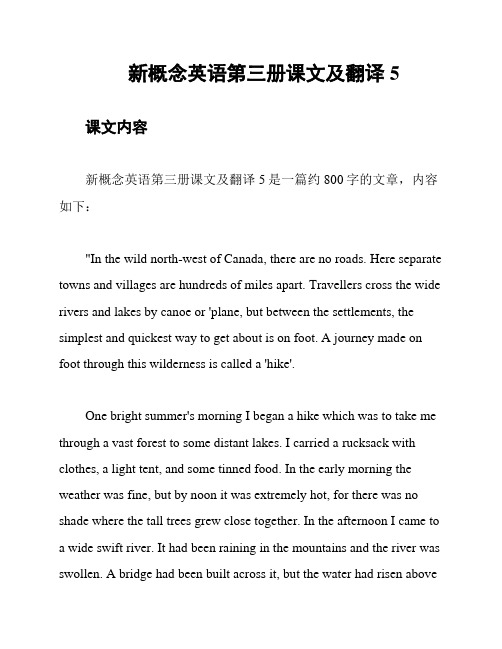
新概念英语第三册课文及翻译5课文内容新概念英语第三册课文及翻译5是一篇约800字的文章,内容如下:"In the wild north-west of Canada, there are no roads. Here separate towns and villages are hundreds of miles apart. Travellers cross the wide rivers and lakes by canoe or 'plane, but between the settlements, the simplest and quickest way to get about is on foot. A journey made on foot through this wilderness is called a 'hike'.One bright summer's morning I began a hike which was to take me through a vast forest to some distant lakes. I carried a rucksack with clothes, a light tent, and some tinned food. In the early morning the weather was fine, but by noon it was extremely hot, for there was no shade where the tall trees grew close together. In the afternoon I came to a wide swift river. It had been raining in the mountains and the river was swollen. A bridge had been built across it, but the water had risen aboveit and it was almost covered by the swift current. I had no wish to risk my life, so I unpacked my inflatable rubber boat and inflated it with my foot-pump. I tied my rucksack to the front of the boat and then swam and paddled my way to the other side."翻译"在加拿大的荒野西北部,没有公路。
- 1、下载文档前请自行甄别文档内容的完整性,平台不提供额外的编辑、内容补充、找答案等附加服务。
- 2、"仅部分预览"的文档,不可在线预览部分如存在完整性等问题,可反馈申请退款(可完整预览的文档不适用该条件!)。
- 3、如文档侵犯您的权益,请联系客服反馈,我们会尽快为您处理(人工客服工作时间:9:00-18:30)。
The facts
确切数字
Part 1:New words and expressions Part 2:Text Part 3:Summary writing Part 4:Special difficulties Part 5:Exercise
New words and expressions
The journalist immediately set out to obtain these important facts, but he took a long time to send them. 记者立即出发去核实这些重要的事实,但 过了好长时间不见他把数字寄来。
Mean while, the editor was getting impatient, for the magazine woul1d soon go to press. 在此期间,编辑等得不耐烦了,因为杂志 马上要付印。
He sent the journalist two urgent telegrams, but received no reply. 他给记者先后发去两份传真,但对方毫无 反应。
He sent yet another telegram informing the journalist that if he did not reply soon he would be fired. 于是他又发了一份传真,通知那位记者说, 若再不迅速答复,将被解雇。
The journalist immediately set out to obtain these important facts, but he took a long time to send them. Mean while, the editor was getting impatient, for the magazine woul1d soon go to press. He sent the journalist two urgent telegrams, but received no reply. He sent yet another telegram informing the journalist that if he did not reply soon he would be fired. When the journalist again failed to reply, the editor reluctantly published the article as it had originally been written. A week later, the editor at last received a telegram from the journalist. Not only had the poor man been arrested, but he had been sent to prison as well. However, he had at last been allowed to send a cable in which he informed the editor that he had been arrested while counting the 1,084 steps leading to the 15-foot wall which surrounded the president's palace.
学习提示: 在主从复合句中,主句倒装,从句不倒装。 例句支持: Only when she is seriously ill(从句) does she ever stay in bed(主句). 她只有在病重的时候才会卧床不起。
Summary writing
1.Did the journalist immediately set out to get the facts after receiving instructions from his editor or not? 2.Did he send them at once or not? 3.Was the editor getting impatient or not? 4.How many faxes did the editor send? 5.What did the editor threaten to do? 6.Was the last fax answered or not? 7.Was the article omitted from the magazine, or was it printed in its original form? 8.When did the journalist send a fax? 9.Why had he been imprisoned?
本文语法:部分倒装 (Partial Anastrophe) 一句话总结: 倒装有时是句子结构的需要,而有时是表 示强调等修辞手法的需要。
原句重现: (Line 13) Not only had the poor man been arrested, but he had been sent to prison as well.
3) only置于句首,表强调,句子要用部分倒装。 Only in this way, can you learn English well. 只有通过这个方法,你才能把英语学好。 Only after being asked three times did she come to the meeting. 只有请了她三次后,她才去开会。
When the article arrived, the editor read the first sentence and then refused to publish it. 稿子寄来后,编辑看了第一句话就拒绝予 以发表。
The article began: 'Hundreds of steps lead to the high wall which surrounds the president's palace.’ 文章的开头是这样的:“几百级台阶通向 环绕总统府的高墙。”
Last year a journalist had been instructed by a well-known magazine to write an article on the president's palace in a new African republic. 去年,一位记者受一家有名的杂志的委托 写一篇关于非洲某个新成立共和国总统府 的文章。
editor ['edɪtə] extreme [ɪk'striːm] statistics [stə'tɪstɪks] journalist ['dʒɜːnəlɪst] president ['prezɪdənt] palace ['pæ lɪs] publish ['pʌblɪʃ] fax [fæ ks] impatient [ɪm'peɪʃnt] fire ['faɪə(r)] originally [ə'rɪdʒənəli]
2) such,so,neither,nor放在句首时句子常用 部分倒装。 So precious is time that we can not afford to waste it. 如此的宝贵以至于经不起我们浪费。 If you won’t go, neither will I. 如果你不去,我也不去。
The editor at once sent the journalist a telegram instructing him to find out the exact number of steps and the height of the wall. 编辑立即给那位记者发去传真,要求他核 实一下台阶的确切数字和围墙的高度。
编辑 极端 统计数字 新闻记者 总统 王宫,宏伟的住宅 出版 传真 不耐烦的 解雇 起初,原先,从前
Text
Editors of newspapers and magazines often go to extremes to provide their readers with unimportant facts and statistics. Last year a journalist had been instructed by a well-known magazine to write an article on the president's palace in a new African republic. When the article arrived, the editor read the first sentence and then refused to publish it. The article began: 'Hundreds of steps lead to the high wall which surrounds the president's palace.’ The editor at once sent the journalist a telegram instructing him to find out the exact number of steps and the height of the wall.
常见的引起倒装的词汇: 1)句首否定和半否定词:no, not, never, seldom, little, hardly, at no time, in no way,not until, 这些词汇置于句首时句子常用部分倒装。 Never have I seen such a performance. 我从来没有看过这么精彩的表演。 Nowhere will you find the answer to this question.你在哪儿都找不到这个问题的答案。 Not until the child fell asleep did the mother leave the room.到孩子睡着,母亲才离开房间。
